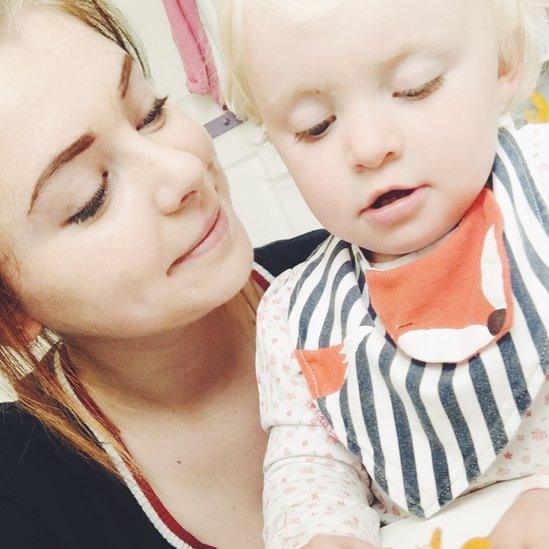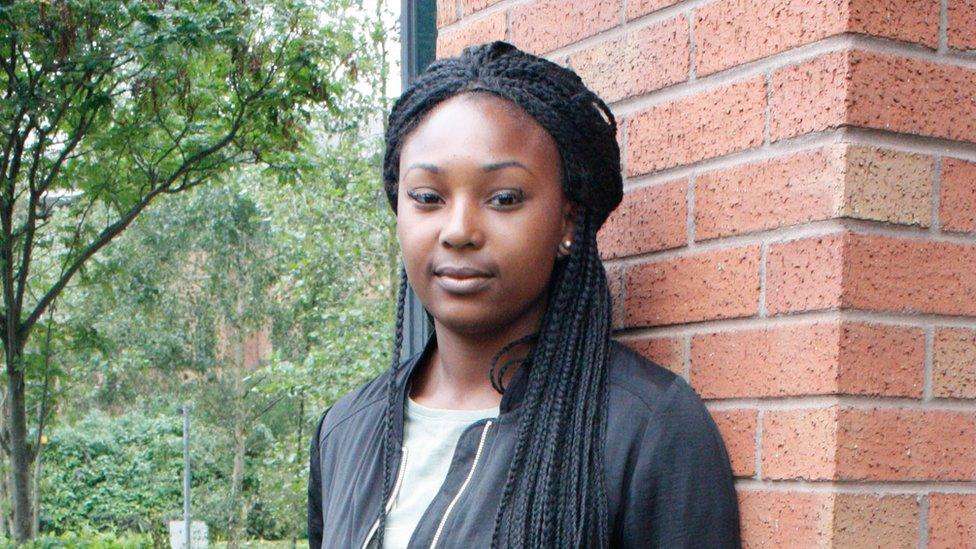'I worry about money most of the time'
- Published

Pippa, now 21, with baby Violet
Pippa has plenty to feel anxious about.
Four years ago, aged 17 and having mental health issues, she dropped out of sixth form.
By the age of 19, she was pregnant, single and homeless.
After months of sofa-surfing and hostels, the council found her a flat which she moved into three weeks after her baby was born.
"I am so grateful for all the support I have had," she says.
She got a job in a local cafe - but the wages were so low, she decided to return to education.
Pippa and baby Violet, 18 months, have now moved to another city, where she has just started an access to higher education, external course.
She hopes to study law at university.
"I want to finish my education to get a job to support me and my child, but I worry about affording to survive while I do it," she says.
She has found a housing association flat and gets by on a mixture of benefits and grants.
She had a few savings, but these were eaten up by the move.
"I also lost a lot of the support network I had." she says.
"I worry about money almost all the time."
Pippa's case is extreme in that she faces multiple challenges - but new research for a charity suggests millions of young people are struggling financially and that, overall, young women are having a tougher time than young men.
Young women are consistently more likely than young men to face money problems, workplace discrimination and worries about the future, says the Young Women's Trust.
Of 4,000 18- to 30-year-olds surveyed in England and Wales:
a third felt more anxious than this time last year
25% of the women said their financial situation was worse, compared with 21% of the men
45% of the women were worried about their mental health, compared with 38% of the men
a third of the women reported gender discrimination at work or while looking for work
Another young mother, Shanae, 24, from London, is a clinical researcher with the NHS.
"I had graduated with a 2:1 but because I was a young woman, and a young black mother on top of that, the environment around me made me feel as if my potential was dented," she says.
"I always had to bring more to the table."

Shanae, 24, is a clinical researcher with the NHS
The research suggests low pay and insecure work are on the rise among young people.
Of those surveyed:
17% had been paid less than the legal minimum wage
30% had been offered a zero-hours contract
45% were living with their parents
44% of the women and 34% of the men felt "worn down"
A government spokesman said helping all young people to get on in life and access skilled jobs "has been a priority".
"Female employment is at a record high, with youth unemployment down 40% since 2010.
"We have also acted to ensure young people can keep more of what they own, including raising the national minimum wage and cutting income tax.
"Our Help to Buy schemes have supported more than 275,000 first-time buyers so far achieve their dream of owning a home."
But for Young Women's Trust chief executive Dr Carole Easton "the traditional stereotype of youthful swagger and optimism seems to have been replaced by worry and anxiety,
"We are used to each generation having more opportunities than the last, but there is a feeling now that things are going backwards."
"These are very worrying times for young people, especially young women, who are hardest hit."
Pippa is determined to provide for her child and afford a roof over their heads.
"I hate asking for help or letting anyone know I struggle. It's humiliating. I don't want to be seen as a stereotype," she says.
"All I'm qualified to do right now is minimum-wage jobs, and no-one can feasibly survive on that, let alone with a child or children."